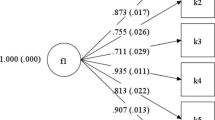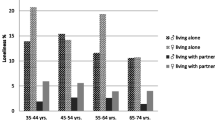Abstract
Goals of work
The purpose of this study was to develop a typology of family functioning in the families of breast cancer patients.
Patients and methods
Seventy-four families (189 individuals: 74 patients, 54 spouses, 46 offspring, and 15 other relatives) completed self-report questionnaires. Perception of family functioning was assessed using the family relationship index (FRI) and its three dimensions (cohesiveness, expressiveness, and conflict) and was classified into groups by a cluster analytic approach. Psychological distress was assessed using the Zung self-rating depression scale (SDS) and the Zung self-rating anxiety scale (SAS).
Main results
Cluster analysis yielded three groups of patients and their family members: one cluster with high cohesiveness, high expressiveness, and low conflict (“supportive” type: n=64); a second group with low cohesiveness, low expressiveness, and high conflict (“conflictive” type: n=65); and a third group with limited cohesiveness, limited expressiveness, and low conflict (“intermediate” type: n=60). Analysis of variance revealed that conflictive families manifested the highest level of depression and anxiety among these clusters.
Conclusions
Typology of family functioning can identify psychologically at-risk families. A family-focused approach can help to reduce psychological distress, especially in conflictive families.
Similar content being viewed by others
References
Armsden GC, Lewis FM (1994) Behavioral adjustment and self-esteem of school-age children of women with breast cancer. Oncol Nurs Forum 21:39–45
Baider L, Kaplan De-Nour A (1986) Family perception and adjustment in postmastectomy women. Int J Fam Psychiatr 7:439–447
Bloch S, Hafner J, Harari E, Szmukler G (1994) Models of family functioning and their measurement. In: Bloch S, Hafner J, Harari E, Szmukler G (eds) The family and clinical psychiatry. Oxford University Press, Oxford, pp. 22–46
Dean C (1987) Psychiatric morbidity following mastectomy: preoperative predictors and types of illness. J Psychosom Res 31:385–392
Everitt BS (1993) Hierarchical cluster techniques. In: Everitt BS (ed) Cluster analysis. Edward Arnold, London, pp. 55–89
Fujio K (2003) Characteristic of Japanese female breast cancer. Sogo Rinsho 52:3074–3076
Fukuda K, Kobayashi S (1973) A study on a self-rating depression scale. Seishin Shinkeigaku Zasshi 75:673–679
Giese-Davis J, Hermanson K, Koopman C, Weibel D, Spiegel D (2000) Quality of couples’ relationship and adjustment to metastatic breast cancer. J Fam Psychol 14:251–266
Grotevant HD, Carlson CI (1989) Family assessment. A guide to methods and measures. Guilford Press, London
Gurman AS, Kniskern DP (eds) (1991) Handbook of family therapy, 2nd edn. Brunner/Mazel, New York
Hall W, Bird KO (1986) Simultaneous multiple comparison procedures in psychiatric research. Aust N Z J Psychiatry 20:46–54
Hoke LA (2001) Psychosocial adjustment in children of mothers with breast cancer. Psychooncology 10:361–369
Holland JC, Mastrovito R (1980) Psychologic adaptation to breast cancer. Cancer 46:1045–1052
Judd CM, McClelland GH, Culhane SE (1995) Data analysis: continuing issues in the everyday analysis of psychological data. Annu Rev Psychol 46:433–465
Kaye JM, Gracely E (1993) Psychological distress in cancer patients and their spouses. J Cancer Educ 8:47–52
Keitel MA, Zevon MA, Rounds JB, Petrelli NJ, Karakousis C (1990) Spouse adjustment to cancer surgery: distress and coping responses. J Surg Oncol 43:148–153
Kissane DW, Bloch S, Burns WI, McKenzie DP, Posterino M (1994) Psychological morbidity in the families of patients with cancer. Psychooncology 3:47–56
Kissane DW, Bloch S, Burns WI, Patric JD, Wallace CS, McKenzie DP (1994) Perceptions of family functioning and cancer. Psychooncology 3:259–269
Kissane DW, Bloch S, Dowe DL, Snyder RD, Onghena P, McKenzie DP, Wallace CS (1996) The Melbourne family grief study. I. Perceptions of family functioning in bereavement. Am J Psychiatry 153:650–658
Kissane DW, Bloch S, Onghena P, McKenzie DP, Snyder RD, Dowe DL (1996) The Melbourne family grief study. II. Psychosocial morbidity and grief in bereaved families. Am J Psychiatry 153:659–666
Lewis FM (1986) The impact of cancer on the family: a critical analysis of the research literature. Patient Educ Couns 8:269–290
Lewis FM (1990) Strengthening family supports. Cancer and the family. Cancer 65:752–759
Lichtman RR, Taylor SE, Wood JV, Bluming AZ, Dosik GM, Leibowitz RL (1984) Relationships with children after breast cancer: the mother–daughter relationship at risk. J Psychosoc Oncol 2:1–19
Maguire GP, Lee GE, Bevington DJ, Küchmann CS, Crabtree RJ, Cornell CE (1978) Psychiatric problems in the first year after mastectomy. Br Med J 1:963–965
Moos RH, Moos BS (1981) Family environment scale manual. Consulting Psychologists Press, California
Morris T, Greer HS, White P (1977) Psychological and social adjustment to mastectomy. A two-year follow-up study. Cancer 40:2381–2387
Noguchi Y, Saito M, Tezuka I, Nomura N (1991) Family Environment Scale (FES) Japanese version: translation and statistical assessment. Kazoku Ryoho Kenkyu 8:147–158
Northouse LL (1995) The impact of cancer in women on the family. Cancer Pract 3:134–142
Ochiai E (1997) The truth about the nuclearization of the family. In: The Japanese family system in transition. A sociological analysis of family change in postwar Japan. LCTB International Library Foundation, Tokyo, pp. 57–72
Okamura H, Watanabe T, Narabayashi M, Katsumata N, Ando M, Adachi I, Akechi T, Uchitomi Y (2000) Psychological distress following first recurrence of disease in patients with breast cancer: prevalence and risk factors. Breast Cancer Res Treat 61:131–137
Okamura H, Yamasaki M, Sera H, Kawai K, Kohata S, Yamawaki S (1991) A study on the reliability and validity of the self-rating anxiety scale. Seishinka Sindangaku 2:113–119
Schag AC, Ganz PA, Polinsky ML, Fred C, Hirji K, Petersen L (1993) Characteristics of women at risk for psychological distress in the year after breast cancer. J Clin Oncol 11:783–793
Steinhoff PG (1994) A cultural approach to the family in Japan and the United States. In: Cho LJ, Yada M (eds) Tradition and change in the Asian family. East–West Center, Honolulu, pp. 29–44
Wallace CS, Dowe DL (1994) Intrinsic classification by MML—the Snob program. In: Zhang C, Debenham J, Singapore LD (eds) Artificial intelligence, sowing seeds for the future. World Scientific, Singapore, pp. 37–44
Watson M, Greer S, Rowden L, Gorman C, Robertson B, Bliss JM, Tunmore R (1991) Relationship between emotional control, adjustment to cancer and depression and anxiety in breast cancer patients. Psychol Med 21:51–57
Zung WWK (1965) A self-rating depression scale. Arch Gen Psychiatry 12:63–70
Zung WWK (1971) A rating instrument for anxiety disorders. Psychosomatics 12:371–379
Acknowledgements
The authors thank all the patients and their families for so willingly giving their time. The authors would also like to acknowledge the collaborative support given by the surgeons, especially Tsuyoshi Kataoka, M.D., Ph.D., and by the nursing staff of the Mammary Gland Dispensary at Hiroshima University Hospital. We also thank Minako Daino, R.N., for her dedicated assistance with the research.
Author information
Authors and Affiliations
Corresponding author
Rights and permissions
About this article
Cite this article
Ozono, S., Saeki, T., Inoue, S. et al. Family functioning and psychological distress among Japanese breast cancer patients and families. Support Care Cancer 13, 1044–1050 (2005). https://doi.org/10.1007/s00520-005-0816-5
Received:
Accepted:
Published:
Issue Date:
DOI: https://doi.org/10.1007/s00520-005-0816-5




